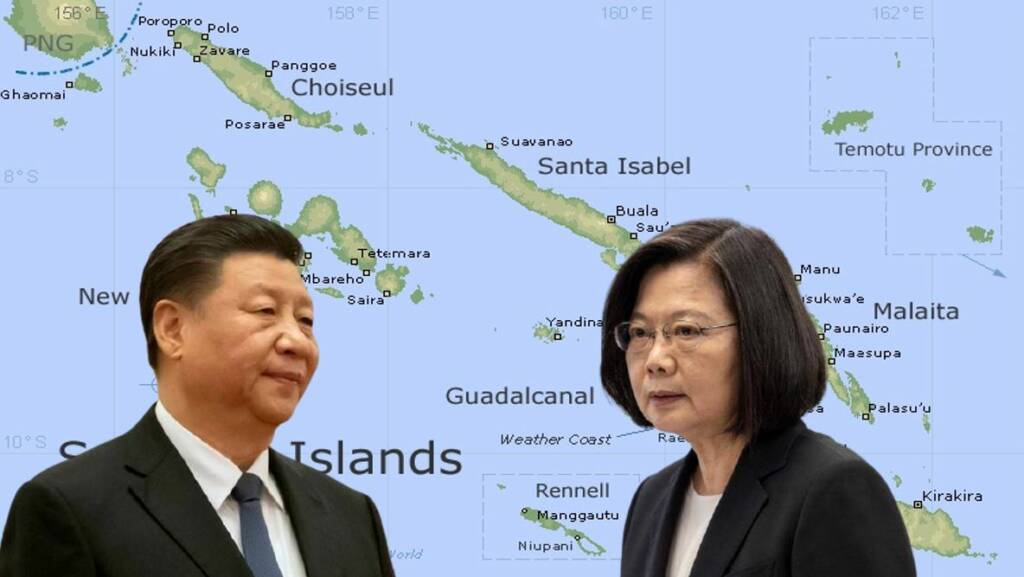There is an intense competition among the larger powers in the Indo-Pacific, and while focusing on the affairs in the larger region, analysts tend to miss the developments in smaller, yet significant Island nations. The situation in the Solomon Islands has become really critical, and as factions reach irreconcilable differences, the situation is on the verge of a civil war.
The destabilising implications of the country’s central government’s “switch” of diplomatic relations from Taiwan to the PRC (People’s Republic of China) in 2019, has been immense. Since then, PRC-linked enterprises and labour have flooded the Solomon Islands, dispersing cash where it is needed, buying influence, distorting local economies, and ushering in a more authoritarian attitude. Now, those working with the central administration are expected to file a ‘Vote of No Confidence’ in the Malaita provincial legislature on Wednesday, October 27. The province has received riot police and armed troops from the federal government, and the scenario, is heated to say the least.
The civil war at doors:
Those who have stood firm in their beliefs have been targeted for bullying, or worse. Malaita, the Solomon Islands’ most populous province, is the current flashpoint. The Malaita Premier, Daniel Suidani, is a widely respected and popular supporter of democratic principles, which has made him a threat to the CCP (Chinese Communist Party) and its allies in the country. When Premier Suidani needed medical care outside the country, the central government refused aid.
And when Taiwan stepped in to supply the needed care, the Chinese Embassy in the country was publicly furious, calling on the central government to punish him.
The federal government’s attempt to demolish the provincial administration in general, and Premier Suidani in particular, is evident in Malaita. The announcement of a vote of no confidence is producing a lot of anxiety and concern in Malaita, as well as in Honiara, the country’s capital. It is apparent that the federal government is supporting this motion and is giving logistical support to its supporters.
Malaitans are located all around the Solomon Islands, so you can’t truly remove them from the entire region – not it’s like it’s a vacuum. It is actually fairly obvious that Premier Suidani and his government have the support of the vast majority of Malaitans.
The larger Taiwan-China geopolitical angle:
Solomon Islands, which used to be Taiwan’s most populous ally in terms of countries that gave it full recognition, switched sides last year and established diplomatic ties with Beijing instead. This week, China also established an embassy in the Solomon Islands, showing how the predatory dragon is eyeing the strategically located archipelago nation for building a military presence in the region. But China is now facing a high-voltage shock from Malaita, which is discussing plans with Washington and its allies for the development of a deep-sea port.
Now, if Malaita decides to break away from the Solomon Islands, then China’s plans of building military presence in the archipelago nation would be practically done to dust. Malaita’s independence referendum has clear markings of support from the free world countries like the US, Taiwan and Australia. Any future Chinese military base in the Solomon Islands would be of no real use, and if the US and its allies are also able to find presence in Malaita, the Chinese presence in the Solomon Islands would get neutralised.
In an interview with The Sunday Guardian, Solomon Islands leader Hon. Peter Kenilorea Jr. said that the public’s resentment of CCP intervention is palpable. Malaita is merely speaking for a large number of individuals around the country.
He said, “As a member of the Bill and Legislation Committee, I’ve travelled across the country. The majority of the people, like Malaitans, overwhelmingly want to keep CCP programmes out, but they don’t have a leader like Premier Suidani. Seeing people all throughout the country publicly support Malaita is eye-opening. Malaita encapsulates how most people feel about the transition [from Taiwan to the PRC]”.
Earlier last year, Peter Kenilorea Jnr, who is also one of the nation’s opposition MPs, said, “Malaita independence has always been simmering but the national government’s perceived disregard of Malaita’s, and to a greater extent the nation’s, voice on the switch would have played a big part in pushing Malaita towards looking more seriously at independence.”.
The Chinese Communist Party, in its efforts to make the island nation a satellite colony, has succeeded in splitting the people of the Solomon Islands into two factions – pro-China and pro-Taiwan. Any future Chinese expansionism in the Solomon Islands is therefore becoming more or less irrelevant. For some time, it seemed as if China made a major incursion, but with signs of Malaita breaking away from the Solomon Islands, it is clear that the US, Taiwan and Australia are the ones having the last laugh. However, the people of the Island will be the ones to suffer, as the pro-CCP and pro-government factions try to remove any and every pro-Taiwan and pro-democracy voice, and all of that could lead to a civil war.
